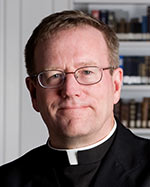ST. FRANCIS – With the teachings of the Second Vatican Council as his backdrop, a Chicago-based author, speaker and theologian discussed ways the Catholic Church can respond to modern culture. Fr. Robert E. Barron
Fr. Robert E. Barron
Fr. Robert E. Barron presented, “Proclaiming Christ to a Secular Culture,” to about 950 people at the Cousins Center as part of the Archdiocese of Milwaukee’s 2012 Pallium Lecture Series on Thursday, Sept. 20
Fr. Barron, founder of the nonprofit Word on Fire media ministry, was recently named rector and president of the University of Saint Mary of the Lake/Mundelein Seminary by Cardinal Francis George, archbishop of Chicago.
Fr. Barron began his hour-long presentation with an example of a Catholic leader familiar to many in Milwaukee: Cardinal Timothy M. Dolan. The cardinal, he said, is especially gifted when it comes to portraying a joy-filled, Christ-filled attitude with the greater community.
“He leads with joy,” Fr. Barron said of Cardinal Dolan. “Just watch him move up the aisle at St. Patrick Cathedral (in New York). This is the style of evangelization we should have in the church.”
During his talk, Fr. Barron gleaned from teachings from Pope John Paul II’s 27 years in the papacy, including an overall view of how today’s Catholic Church should function with changing times and changing culture.
“The church doesn’t have a mission,” Fr. Barron said. “The church is the mission.”
The Catholic Church can address societal changes through new methods, according to Fr. Barron. Through his Word on Fire ministry, Fr. Barron presents the Gospel through new platforms, including You Tube and social media outlets.
Watch a video of Fr. Barron’s Sept. 20 lecture |
Fr. Barron readily asserts that the Catholic Church dropped the ball with new media while Protestant counterparts quickly took to burgeoning technology.
“We have a number of options available to us that Fulton Sheen would die for,” Fr. Barron said, referring to the archbishop and host of the “Life is Worth Living” TV series that ran in the 1950s.
Fr. Barron took to You Tube in 2006 with messages focused on Catholic teachings, just as the Internet site began to grow in popularity. He also frequently examines books, music and movies and points out hints of the Gospel in secular culture.
Over time, Fr. Barron said he has engaged in conversations with people from a number of countries outside the United States.
“There’s a global reach, and it’s instant,” he said. “That’s the power of new media.”
Some of the most frequent You Tube visitors, Fr. Barron said, are men in their 20s, 30s and 40s – a demographic the church has historically had difficulty reaching.
While having new media platforms is noteworthy, the message conveyed through those platforms is of the utmost importance. Sounding an optimistic tone, Fr. Barron said there are previously unheard of opportunities to spread the Gospel with a world desperately seeking for answers.
“There’s deep confusion (in secular culture) about what we mean when we say, ‘God,’” Fr. Barron said. “There’s deep indifference, and a deep misunderstanding.”
Through his media ministry, Fr. Barron said he has engaged in conversations with people who view God as a threat to human flourishing.
“My biggest battle on the Internet is coming across people who think of God as a fussy competitor,” he said. “We live in an increasingly disenchanted world where people believe this is all there is.”
But Fr. Barron pointed to the teachings of St. Augustine and expressed optimism in reaching out to secular culture.
“St. Augustine identified the restless hearts that we have as humans,” Fr. Barron said. “God made us. Like it or not, we’re hard-wired for God. This is more than just a ‘my God is bigger than your god story.’”
Fifty years after the opening of the Second Vatican Council, Fr. Barron said there is a renewed vibrancy in the church to spread the Gospel in an applicable manner with secular culture. He challenged parishioners not to engage in what he likened to “beige Catholicism.”
“If we’re lacking in our message, sharp colors become dulled and loud noises become muted,” he said.
The Archdiocese of Milwaukee has hosted the Pallium Lecture Series in recent years with grants from the Lynde and Harry Bradley Foundation.
Milwaukee Archbishop Jerome E. Listecki spoke briefly during last week’s program. He said the lecture series has enriched the church locally.
“It’s important that we take our faith and share it with others,” Archbishop Listecki said.
